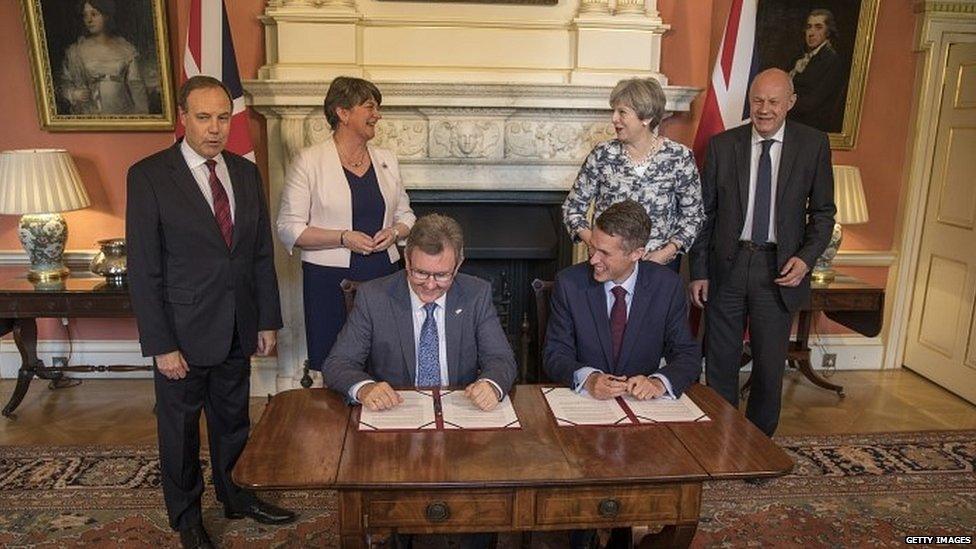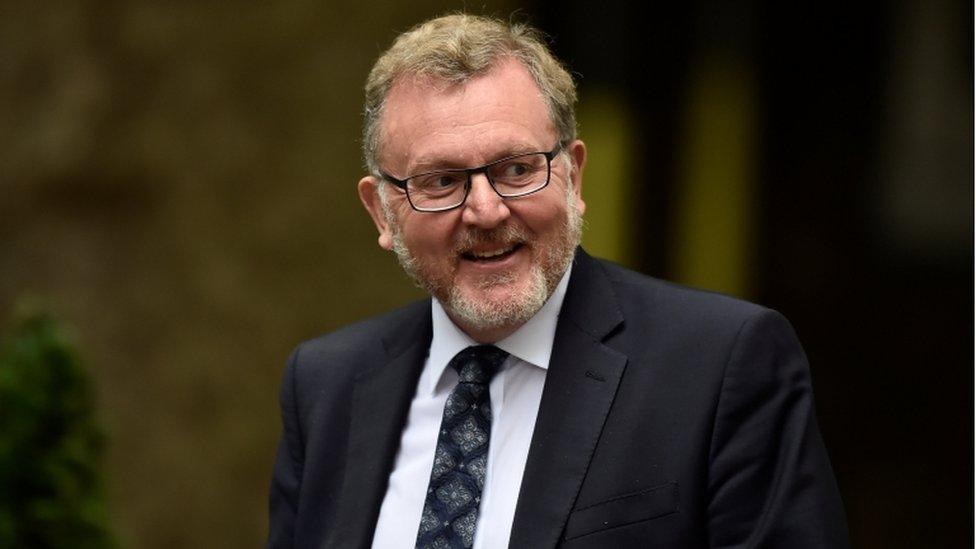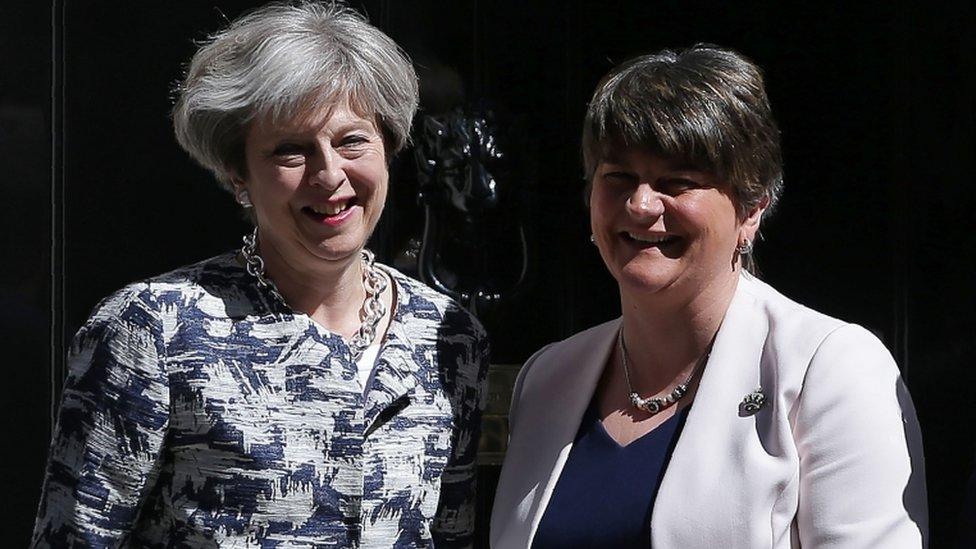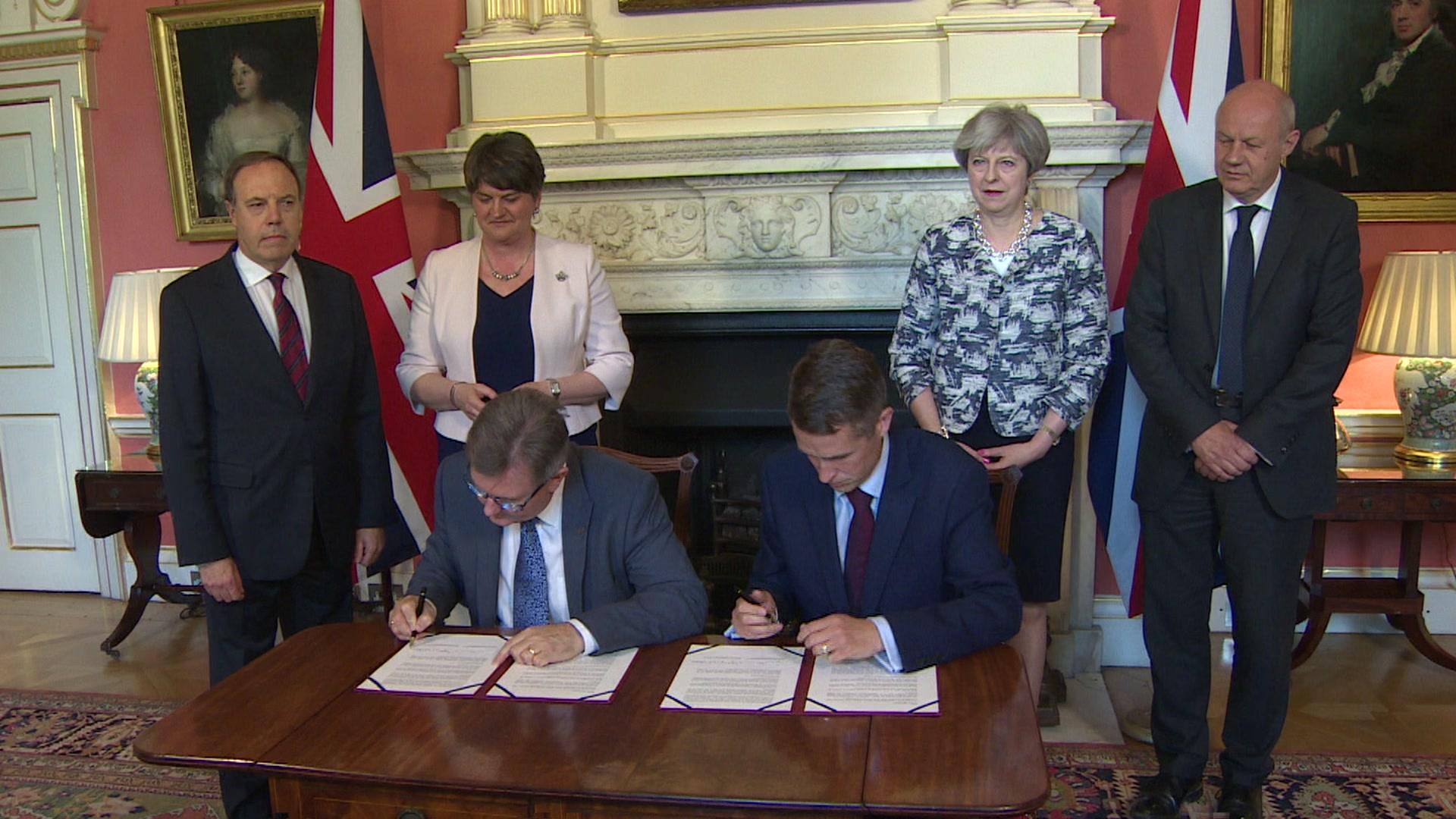The DUP deal via a Helensburgh swimming pool
- Published

Before the deal was signed
It is rather a stretch, I would admit, from the future of the European Union, the fate of the UK government and the condition of Scotland.
It is scarcely the answer to the meaning of life, the universe and everything. Which, if you remember from the Hitchhiker's Guide to the Galaxy, was 42.
However, I invite you today - as I have been comparably invited - to consider the good people of Helensburgh and the delight they take in swimming.
Why, I hear you ask, not unreasonably? Because the fair burgh on the Clyde got five million quid in the 2016 UK Budget to spend on a pool.
And? And it wasn't part of the Barnett formula in any way. It was cash on the nail, for lanes and diving boards and the like.
This matters how? Because it proves, according to the UK government, that money may be allocated outwith Barnett - just as in the case of the £1bn going to Northern Ireland as part of the confidence and supply deal with the DUP.
Told you it was a stretch.
Still, let us give it a run (or, in the case of Helenburgh, let us take the plunge). Let us consider, dispassionately, as always, the competing arguments.

What would Lord Barnett do?
Firstly, the formula named after Joel Barnett does not generally draw comparisons between Scotland and the other devolved territories of the UK.
It predicates a sum spent upon government departments in England and applies two factors. The comparability factor - that is, the extent to which the English spending compares with demands placed upon a devolved administration.
And the population factor - a sum which calculates the relative numbers of citizens in England, Scotland etc.
So, strictly, the cash for NI does not, of itself, instantly demand Barnett comparability.
Then two other points. The Barnett formula is non-statutory. Its rules are by convention and agreement. Its rules are, ultimately, what the Treasury say they are.
And there has been formula bypass in the past. I refer my honourable friends to the topic of the Helensburgh swimming pool, no doubt to be a source of joy and delight to the residents of John Logie Baird's birthplace. Plus City Deals and substantial cash for NI in the past.

David Mundell has previously said he would oppose any deal that "deliberately sought to subvert the Barnett rules"
Good caveats all. Reasonable and arguable. Expect to hear them advanced in the coming days.
However, there is a wee snag here. It was not the opposition parties who insisted, initially, upon the application of the Barnett formula in relation to any putative DUP deal. It was the Secretary of State. For Scotland.
In advance of today's deal, David Mundell said there were rules about funding in the UK. Clear rules. And, he added, if the funding fell within the scope of Barnett then cash should come to Scotland too.
Indeed, he signalled that he would contest any deal which breached that position.
Pedants that they are, Mr Mundell's rivals now want to hold the Secretary of State to his word. They say he should join them - the Scottish and Welsh governments plus others - in demanding a wider distribution of cash.
The Scottish Conservative leader Ruth Davidson says this is hypocrisy. That those critics know that formula bypass is feasible. That the deal is intended to ensure UK stability.
'Grubby, shameless deal'
And the line from the Scotland Office? I suspect they have had better days. But they insist that the Secretary of State was simply demanding clarity: that he wanted an upfront deal, rather than anything in any way underhand.
It is implied further that he may now be able to wield influence to secure future advantage for Scotland with the Treasury, citing today's controversy.
Somehow, I cannot see Mr Mundell's critics buying that one. Carwyn Jones, the Welsh First Minister, calls the package "an outrageous straight bung". He dismisses talk that it compares with formula-bypassing expenditure such as city deals (or the Helensburgh poll which, unaccountably, he failed to mention).
And Nicola Sturgeon? She says it is a "grubby, shameless deal" which deprives Scotland of, potentially, around £2.9bn.
These critics say they do not remotely begrudge additional expenditure in Northern Ireland. They simply want comparability. And they question whether the cash would have been contemplated at all had Theresa May gained a majority in the Commons.
They think they know the answer to that one. And it is not 42.
- Published26 June 2017

- Published26 June 2017
